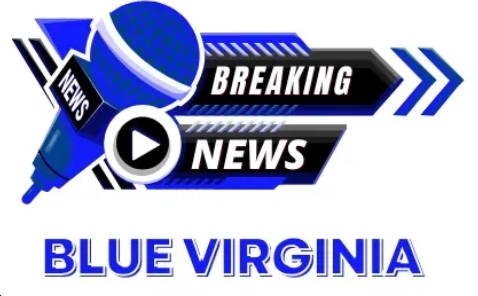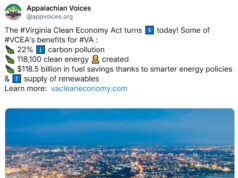by Ivy Main, cross posted from Power for the People VA
If you were bewildered by the sheer volume of bills addressing solar, efficiency, storage, and other energy topics that I outlined last month, take heart: clean energy advocates don’t have nearly as many bills to keep track of now. So few bills survived the Finance and Commerce and Labor Committees that it will be easier to talk about what is left than what got killed.
The bigger story, of course, is the Dominion Ratepayer Rip-Off Act of 2018, which the utility would dearly love you to think of as the “grid modernization bill,” but which might be better imagined as an oozing pork barrel. Recent amendments do make it less obnoxious than it was last week (begging the question of why it wasn’t introduced that way in the first place). The Governor now says he supports the bill, the Attorney General continues to oppose it, and the SCC keeps issuing poisonous analyses.
But right now let’s just run down the fate of the other bills we’ve been following. For explanations of these bills, see previous posts on solar; efficiency, storage and EVs; and energy choice, carbon and coal.
Of the bills affecting customer-sited solar, only a handful remain:
- HB 1252 (Kilgore), expanding the pilot program for third-party PPAs in APCo territory to cover all nonprofits and local government: amendment ensures current Dominion pilot is unchanged, passes the House, goes to the Senate
- HB 1451 (Sullivan), allowing a school district to attribute surplus electricity from a solar array on one school to other schools in the district: amendment turns it into a pilot program, passes House C&L
- SB 191 (Favola), allowing customers to install solar arrays large enough to meet 125% of previous demand (up from 100% today): amended to exclude customers in coop territory*, passes Senate C&L
Delegate Toscano’s bills promoting energy storage remain alive. HB 1018, offering a tax credit for energy storage devices, passed a House Finance subcommittee last week with an amendment to delay its start date to 2020. HJ 101, calling for a study, passed Rules but then was sent to Appropriations, where it was to be heard yesterday. (The Legislative Information Service does not yet show its fate.)
HB 922 (Bulova), allowing localities to install EV charging stations, has been reported from General Laws with amendments.
The Rubin Group’s land use bills passed their respective houses with amendments. The bills are SB 429(Stanley), its companion bill HB 508 (Hodges), SB 179 (Stanley) and companion bill HB 509 (Hodges).
All other customer-focused solar bills died. So did energy efficiency goals, the mandatory renewable portfolio standard, LED light bulb requirements, and tax credits for EVs and renewable energy. Direct Energy’s energy choice legislation died in both House and Senate in the face of Dominion’s opposition, in spite of an astonishingly diverse array of business supporters; even the support of Conservatives for Clean Energy was not enough to garner any Republican votes in the House C&L subcommittee.
Republicans also killed the Governor’s RGGI bills while passing Delegate Poindexter’s anti-RGGI bill, HB 1270, in the House. Delegate Yancey’s anti-regulation HB 1082, appears to be alive in a subcommittee, though Delegate Freitas’ anti-regulation bill died, and Senator Vogel’s effort to change the constitution to allow legislative vetoes of regulations died in committee.
Delegate Kilgore’s HB 665, restoring tax subsidies to coal companies to facilitate destroying Virginia mountains, passed House Finance on a party-line vote. Shockingly, Senator Chafin’s similar bill, SB 378, passed the Senate with support from Democrats including Marsden, Petersen, Edwards, Dance, Lewis and Saslaw.
So once again, in spite of a remarkable election that swept progressive Democrats into the House and nearly upended Republican rule, clean energy advocates have done poorly this year. Some of their priorities are now part of the Dominion pork barrel legislation, to be sure. But that legislation enables utility solar and utility spending; it does nothing for customer-owned renewable energy, market competition, climate action, or consumer choice.
Dominion still rules the General Assembly, though the legislators who voted in line with the utility’s wishes won’t admit it—or give any other explanation. The Republican members of the House Commerce and Labor subcommittee slashed their way through the pro-consumer bills with ruthless efficiency, and did not bother explaining their votes. (A special shout-out goes to Democratic delegates Kory, Ward, Heretick and Bourne for just as stubbornly voting in support of the good bills.)
But over in Senate C&L, chairman Frank Wagner tried to maintain the pretense that he was merely “referring” his colleagues’ bills to the Rubin Group instead of actually killing them.
The closed-door, private, invitation-only, utility-centric Rubin Group has no legislators among its members and proposes only changes to the law that all its members like, so “sending” a bill there that the utilities oppose is pure farce. Yet that was the fate of Senator Edwards’ bills on third party PPAs, agricultural net metering, and community solar, and Senator Wexton’s community solar bill. Wagner instructed these Senators to “work with” the Rubin Group on their bills. None of the other committee members objected.
But it’s not like the Rubin Group achieved much, either. Its hallmark legislation putting 4,000 MW of utility solar in the public interest got thrown into the Dominion pork barrel (and was later upped to 5,000 MW), along with energy efficiency bills designed to eliminate the SCC’s over-reliance on the RIM test, requirements for utility spending on energy efficiency, and Delegate Habeeb’s nice battery storage pilot program. They all became tasty morsels designed to offset legislators’ queasiness over the ratepayer rip-off and, not incidentally, to maneuver advocates and bill patrons into supporting Dominion’s bill as the only way to get their own legislation passed into law.



 Sign up for the Blue Virginia breaking news newsletter
Sign up for the Blue Virginia breaking news newsletter![Wednesday News: “The Grand Opening of an American Concentration Camp”; Trump Threatens to Arrest Mamdani; “Poorest Americans Would Be Hurt By Trump’s Big Bill”; [VA] GOP nominees share stage, but not unity”; “Hoos your daddy, Virginia?” (Not Youngkin)](https://bluevirginia.us/wp-content/uploads/2025/07/montage0702-238x178.jpg)







![Wednesday News: “The Grand Opening of an American Concentration Camp”; Trump Threatens to Arrest Mamdani; “Poorest Americans Would Be Hurt By Trump’s Big Bill”; [VA] GOP nominees share stage, but not unity”; “Hoos your daddy, Virginia?” (Not Youngkin)](https://bluevirginia.us/wp-content/uploads/2025/07/montage0702-100x75.jpg)
![[UPDATED with Video of the Event] Billboard Truck Highlights GOP Ticket Chaos and Infighting Outside of Winsome Earle-Sears’ Campaign Event](https://bluevirginia.us/wp-content/uploads/2025/07/reidtruck2-100x75.jpg)